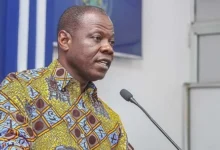NaBCo beneficiaries tour farm in Tain District

THE District Chief Executive (DCE) for Tain in the Bono Region, Mrs Charity Foriwaa Dwommoh, has advised the youth, especially graduates to embrace the concept of pooling resources to explore existing business opportunities.
She said per the dynamics and challenges of the local business environment, forming partnerships would be the best way for business starters like fresh graduates to be competitive.
“The world is changing and you can’t be a lone ranger; no man is an island now. Partnership is the best way forward, it could be friends, family members or an association,” the DCE stated.
Mrs Dwommoh made the call when she led National Builders Corps (NaBCo) beneficiaries in the Tain District on a tour of a five-acre irrigated okra farm at Tainso, owned by two young graduates.
The field trip among others was aimed at leading the NaBCo beneficiaries to appreciate at first hand the dynamics of farming and they can leverage it to better their fortunes after exiting the three-year programme.
The Tain DCE urged NaBCo beneficiaries and unemployed graduates in general to look beyond white collar jobs and venture into productive sectors like agriculture.
The Assembly, she indicated, had made provisions for technical, logistics and finance to cushion motivated graduates into agriculture, adding: “even if we have to fall on Microfinance and Small Loans Centre (MASLOC) for assistance, we’ll not hesitate.”
Touching on access to arable lands, the DCE entreated traditional authorities and other custodians of farmlands to make lands available to the youth for agricultural purposes at flexible terms.
In an interview with the Ghanaian Times, Nelson Asare, co-owner of the okra farm said a startup capital of about GH¢30,000 had been invested into the farming project, indicating that the money was raised from the personal savings of the partners.
He stated that the bulk of the money was spent on irrigation infrastructure such as water pumping machine and pipes on the farm.
Mr Asare, a graduate of the University for Development Studies (UDS) noted that they strategically started the cultivation in the dry season so as to capitalise on high demand for okra during such periods.
He was optimistic that ‘all things being equal’, the farm was estimated to generate returns, not less than GH¢300,000 which would be reinvested in the cultivation of other vegetable crops such as cabbage, tomatoes and carrots.
For his part, Emmanuel Donkor, the co-partner, a graduate of the University of Education, Winneba, appealed to the government to introduce more policies to make mechanised agriculture easier to pursue and attractive to the youth.
He mentioned difficult access to agricultural finance, especially for start-ups and high cost of farm implements as some pressing issues that demand further attention.
FROM DANIEL DZIRASAH, TAINSO







